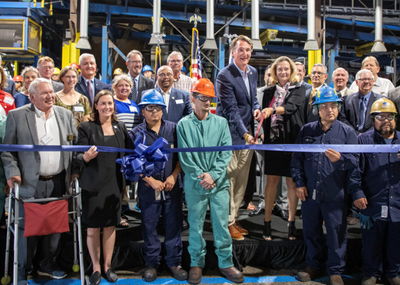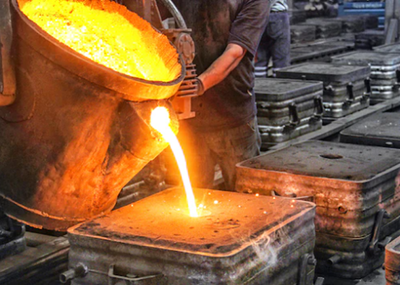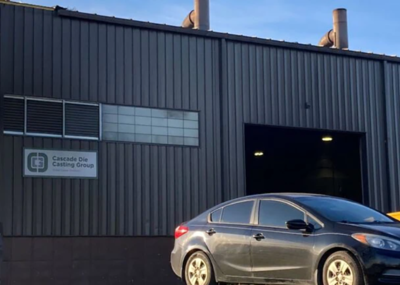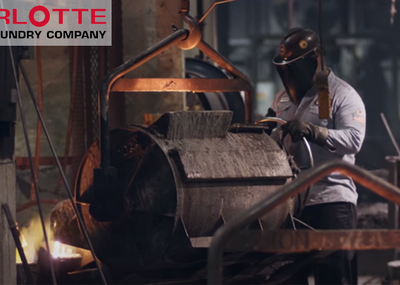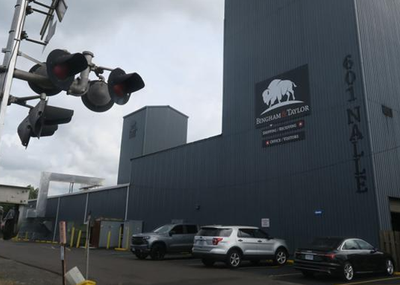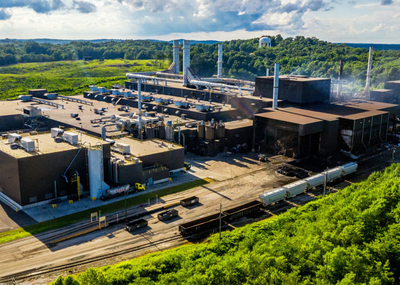Officials from The Ford Meter Box Company, the City of Wabash, Wabash County and several other firms broke ground Thursday on what is thought to be the largest expansion ever in Wabash County.
The 300,000-square-foot, state-of-the-art non-ferrous foundry will sit on a 90-acre site in Wabash’s northeast industrial park. The expansion is expected to cost between $250 and $300 million.
Company President and CEO Steve Ford noted that Keith Gillenwater, president and CEO of Grow Wabash County, recently called economic development a team sport.
“So is building a foundry,” Ford said, asking for those involved in the project over the last 18 months to be recognized.
“It’s not often that Ford Meter Box evaluates the need for factory expansions,” he continued. “We’ve been lucky. We’ve been able to accommodate most of our needs with equipment upgrades or by adding people at our present site on Manchester Avenue.
“It’s actually been quite a few years that we’ve added space at Manchester Avenue where, as many of you know, we build waterworks projects for underground subdivision work and the like, or at Pell City, Ala., where we build larger projects for public infrastructure.”
The 125-year-old company last relocated foundry operations during the 1970s when back-to-back construction projects accommodated a pattern shop, core-making and automated green-sand molding equipment.
The company, he said, looking back on its history, has poured metal since its early days in the city, more than 100 years ago. The site was then on South Carroll Street, where the John Drook Memorial Skate Park now stands. A portion of the building remains at the site in honor of its former tenant.
When the company moved to its current location in 1951, a brass foundry was located on the top floor of the stone building, Ford continued, noting that part of the building is now used as a fitness center.
“It wasn’t there long,” he said of the original foundry. “In 1957, the foundry moved maybe 100 yards or so to a building that was attached to the south end of our building. It was there until it was decommissioned maybe 20 years or so later.”
The foundry remained there until the 1970s when two separate building projects were completed. Those two projects made room for an assembly building.
“Until today, that assembly building was our largest building project in our history,” Ford said. “The foundry buildings in place since 1971 and 1977 have served us well for 50 years.”
The expansion project, he said, was triggered by capacity needs and the need to modernize equipment.
Many have asked why not build near the current factory, Ford noted. The topography didn’t cooperate with the plan, he said, causing the need to come to the industrial park.
Gillenwater and Mayor Scott Long also briefly spoke during the ceremony.
Ford Meter Box began in Hartford City in 1898. Edwin Ford, who founded the company, moved it to Wabash in 1911.
The decision to move the company, Long said, has benefited the City of Wabash for many years.
“The expansion will be beneficial for years to come,” he continued. “Wabash has been blessed to have the Ford family associated with the city for many years. I can only hope the relationship has been as comfortable with Ford Meter Box as it has been to Wabash and Wabash County.”
Gillenwater said the project will pay dividends to the community and to Ford Meter Box for years to come.
The new foundry is expected to support a substantial increase in brass production while allowing room for future production lines. Capacity improvements throughout the facilities will require additional staff; however, hiring numbers will depend ultimately on business levels.
Source: www.thepaperofwabash.com


